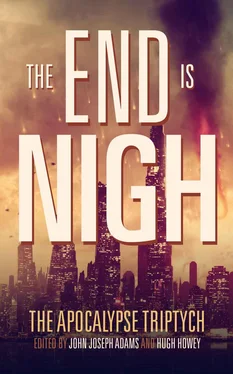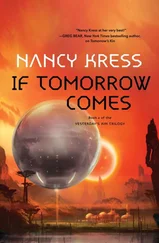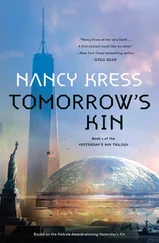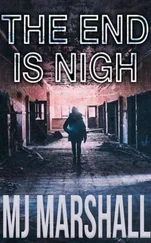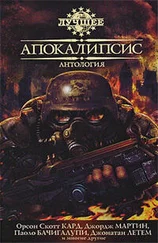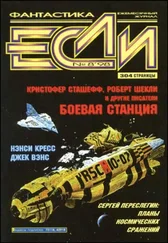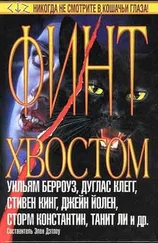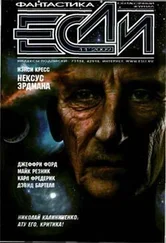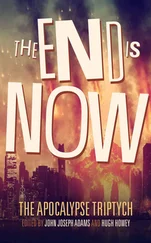“May I have a Cosmopolitan, please?” she asked the bartender. “Easy on the vodka, and could I have an extra slice of lime, if you wouldn’t mind?”
She sat beside me and we went over our numbers for the day.
“I just enforced an entire family,” she said, sipping her Cosmo. “The husband was buying a bunch of those suicide kits out the back of a van on Flatbush. They were planning to do it all together. Mom, dad, two girls, a little boy, even the dog and cat! Like, hold hands, pray, and die.”
“So what happened?”
“Oh, I followed him home. Then I enforced them all. Even the dog and cat. I wish I knew what happens to dogs on Judgment Day.”
“I wish you would stop calling it that.”
“Sorry, just a reflex from Bible school. We’re due for a meeting at headquarters, you know,” she said, checking her slender watch and suggestively eyeing my full drink.
“I know, I know,” I said. “I’m chugging.”
I chugged.
• • • •
Headquarters was set up inside a warehouse in Red Hook. Twenty thousand square feet of concrete floors, and the ceilings yawned high overhead so the acoustics were terrible. The Brooklyn Division Enforcement Team gathered here to report our numbers and receive feedback on our performance. Our managers gave us little pep talks about how essential our efforts were toward ensuring a smooth and pleasant transition toward the end of the world.
On one wall was a whiteboard scribbled with encouraging messages and enforcement data. On the opposite wall was a countdown clock.
There were several thousand team members in our division. We filled the room to the brim with breathing and sweat and chatter and stink. We divided our attention between the stage at the front and the countdown clock, which was a handy measure of how late we were getting started.
Finally the meeting was called to order.
“Your numbers are down,” the boss shouted at us. He had reason to be nervous; managers with poorly performing teams tended to find themselves on the wrong end of the ray gun. “You’re down compared to Manhattan; you’re down compared to Queens. Shall I go on?”
There was a muttered undercurrent of rebellion.
“I don’t care, I don’t care, from now on I don’t want to hear any excuses,” he bellowed into the microphone. “We’re almost there. Three days from now—we’re in paradise. Seven virgins, clouds and harps, free beer, gold-plated toilet seats—whatever floats your boat. Just keep your goddamn numbers up.”
From now on, we’d be reporting every hour. Checking in, every hour, on the hour, and if we hadn’t enforced anyone, there would be some explaining to do.
“Just three more days,” he said. “Just three more days and this will all be over. Now go home, get some rest, and I want to hear from everyone at 9 a.m. sharp.”
Sara Grace and I walked to the subway together. “Wanna come over for a nightcap?” I asked. “I bet you need one. I sure as hell do.”
“Thank you,” she sighed. “I really shouldn’t. I need to get some sleep. I’ll see you tomorrow?”
“Yeah. No problem. See you then.”
That night I lay awake thinking about her. It had been a long time since I’d let myself fall for anyone. Now I had it bad. And I didn’t have much time left.
• • • •
The Aliens: most people called them The Travelers, but I thought of them as The Mickey Mouse Club, because of the human mouthpieces they’d chosen. They were all washed-up child actors and stars of reality TV shows. They all had those bland good looks, and none of them had ever said anything remotely interesting on their own terms, so they were the perfect avatars to relay the message.
Apparently, the aliens’ physical manifestations were repulsive to human sensibilities; I’d never seen one in the flesh, but I’d heard stories. These long-lived rumors started and spread with a twisty life of their own. From what I’d gathered, the aliens resembled something like scaly seahorses or obese horned toads.
But no one ever saw these bodies, at least not on TV. It was spectacle; it was all smoke and mirrors. They had technology we couldn’t even begin to comprehend. The universal translator, the ray gun, the spaceship, the empathetic mind links. So they hung back and spoke through their human avatars, and even if those actors were lost without their laugh tracks, they looked just like what you’d expect.
Of course, the government’s dormant propaganda wing swung into full gear. There was no time for Victory Gardens, but citizen safety patrols were in business.
And enforcers, of course.
• • • •
The next morning I woke with dark circles under my eyes. I’d stayed awake too long, obsessing about Sara Grace and imagining a way out of all this. As far as I could tell, there was none.
I showered, made myself presentable, and headed to the nearby diner where Sara Grace and I met for breakfast every morning. The local clientele was pretty depleted, so service was fast, and we always got our waffles for free.
Sara Grace was late. Maybe she’d had a rough night too.
I was sitting there sipping my coffee when a guy I’d never seen before strolled in. He was tall and craggy, wearing tight blue jeans, cowboy boots, and a leather jacket that had seen better days. He obviously hadn’t encountered the inside of a barbershop in some time. He slid into a booth and ordered the number five.
My first check-in was in thirty-two minutes, and I hadn’t enforced anyone yet, so I went over to see what was up. “You mind?” I asked.
“Not at all,” he boomed, and I slid into the booth across from him. He stank of cigarettes and the open road.
“So what brings you to the neighborhood?” I asked idly, taking one of his sugar packets and dumping it into my own coffee.
He laughed, a big laugh that filled the diner. The other patrons glanced over, then quickly averted their eyes. “I stick out that much, do I?” he said. “Like a sore thumb, I bet.”
I shrugged in a noncommittal way. “Hey,” I said. “I’m sure I’d stick out in your hometown, too.”
“That you would,” he agreed. “Well, it’s kind of a funny story. I’m from Oklahoma, you see. Place called Muskogee. You probably wouldn’t have heard of it. Anyway, spent most of my life working on a warehouse floor, stacking crates. Got married, got divorced, got married again, divorced again. Had a couple of kids. Always one thing or another. I went on this road trip when I was real young, a couple of buddies and me, right before Susie, that’s my first wife, got knocked up. After that, you know, life happens. So when the news came down, I figured, it’s now or never, right? Quit the job, bought a Harley, hit the road.”
I wondered idly how he’d made it this far. Sounded as if the team in Muskogee was slacking off.
He told me about his trip, and I listened. His eyes shone as he described the breathtaking vastness of the Grand Canyon, the stunning beauty of the Nebraska plains. The St. Louis arch, that gateway to the west. The mist hanging spectral and ghostly over the Smoky Mountains, and the twisting, narrow roads winding their way through the foothills. The Carolina low country, the sun rising like a tangerine over the glittering ocean and the Outer Banks.
“It’s been a life-changing experience,” he said, mist in his eyes. “I’ll tell you what. I just wish I had more time.”
“I think we all do,” I said.
I let him finish his breakfast and pay his check. He’d made it this far, and I still had a few minutes before my first check in. It was the least I could do.
I enforced him on my way out the door.
“Epic road trip?” Sara Grace asked. We’d developed a sixth sense for these kinds of things.
Читать дальше
